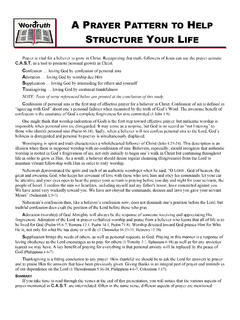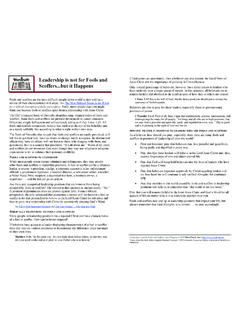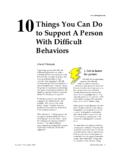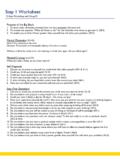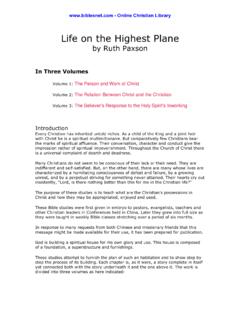Transcription of A Prayer Perspective To Enlarge Prayer’s Parameters
1 Every believer in Christ prays. Some pray throughout the day in response to the scriptural admonition to pray without ceasing (1 Thessalonians 5:17). Others pray when they feel like it, some pray according to a daily schedule, and others pray primarily in response to emergencies or special needs. Many pray before they eat and before going to sleep. No matter how often, where, or why one prays, every believer knows that one s Prayer life needs improvement. A believer s Prayer life typically improves when the corresponding need and privilege of growing in Christ is recognized. See Do You REALLY Believe What You Say about Prayer ? at In addition, on-going improvement of one s Prayer life depends on faithfully abiding in Christ. See Prayer : A Viable Option or Absolute Necessity at and Prayerlessness: A Reflection of Self-Centeredness at The above articles mention many aspects of Prayer which you can review for God s glory and your spiritual benefit.
2 The remainder of this article, however, presents a Perspective on Prayer that is often missing in a believer s Prayer life. What follows is a reprint of chapter 12 of Speaking Truth in Love by David Powlison.* The narrative begins in the context of a pastor s evaluation of a church s biblical counseling ministry. However, this particular Prayer Perspective might be applicable to every need or request you ever utter or hear. WHAT WILL YOU ASK FOR? Let s say you ve become convinced that biblical counseling should be a core ministry of the church of Christ. Where do you begin? It is natural perhaps to think first of starting a formal counseling ministry or a training program for lay counselors, or of hiring a pastor who will specialize in pastoral care and the cure of souls. But let me suggest a humbler, simpler starting point. Take things that you and your church are already doing. For example, consider Prayer or small groups or worship or premarital counseling or hospital visitation.
3 Rethink the way you do these things. What are the implications of the fact that Jesus Christ is always counseling his beloved people? What are the implications of the fact that the Bible is always addressing the particulars of what people want, trust, fear, think, feel, and act? Take Prayer , for example. Almost by definition, a church prays, a Christian prays. But how do we pray? What do we ask for? What do our prayers actually talk about? How does a counseling vision teach people a different way to make Prayer requests? How does it change the way we pray? Over the years, I ve listened carefully to prayers. I ve heard and participated in pastoral prayers, Prayer meetings, small Prayer groups, individual Prayer requests. People tend to pray for predictable things. Among the most common: y Heal the sick y Comfort the bereaved y Provide jobs and money to those in financial straits y Bring family, friends, neighbors, and coworkers to faith in Jesus y Help people to make major decisions wisely y Protect those who are traveling y Solve troubles and conflicts in family, work, school, and church y Help us fulfill responsibilities on the job or in school y Make ministries fruitful locally and around the world y Bless and be with people, that good will happen There s nothing wrong with asking for any of these things.
4 They are good gifts. But notice something. None of them involve the sanctification and transformation of the one making the request or the one for whom you are praying. Such Prayer requests ask for good gifts, but they do not ask for the best gift, that our lives would be remade into the image of Jesus. A Prayer Perspective To Enlarge Prayer s Parameters 2015 WordTruth, Inc All Scriptures are from the New American Standard Bible (NASB), Copyright 1960, 1962, 1963, 1968, 1971, 1972, 1973, 1975, 1977, 1995 by The Lockman Foundation. A Prayer Perspective To Enlarge Prayer s Parameters What do you ask people to pray for? What do others ask you to pray for? It s as though we each look at life through a video camera and ask for changes in everything except the person filming. The cameraman is never in view. In other words, the counseling or wisdom needs of the person are rarely talked about. We will pray with parents for their straying teenager to straighten out; we rarely pray for the parents not to be fearful, bitter, passive or controlling.
5 We will pray for a person to get a job; we rarely pray that he would grow in faith as he learns not to fret about money. We pray for the conversion of someone s loved ones; we rarely pray that the believer would grow more loving and honest in the way she treats those loved ones. A biblical counseling vision will alter how you ask for Prayer and how you pray. It is one of the simplest ways to start incorporating a biblical counseling vision into your life and ministry. As people learn to pray in a different way, they start to have reasons to counsel each other more meaningfully. They get in touch with the real battles. They increasingly enter into the primary lifelong calling to be a disciple, a learner. A lifelong learner knows a profound need to give and receive counsel every day (Hebrews 3:12-14) in order to grow up into the image of Jesus. As people become disciples, they increasingly understand their need for counsel.
6 A church learning to pray rightly is a church taking a bold step toward becoming a community of mutual counsel. Let s look at this through the particular example of praying for the sick. These are probably the most common Prayer requests of all. I will frame the discussion from the standpoint of a pastor, who often invites and hears Prayer requests, and often prays pastorally. The application to other problems and persons will be obvious. How do you encourage members to pray beyond the sick list? This question has a simple answer but one that will keep all of us going for a long time: your members begin learning to pray beyond the sick list when you know how to pray beyond the sick list. It sounds so simple. But it must not be that easy. Many pastoral prayers do not pray beyond the sick list .. and they do not even pray very pointedly or intelligently for the sick. Many pastoral prayers sound like a nursing report at shift change in your local hospital: The colon cancer in room 103 with uncertain prognosis.
7 The broken leg that s mending well .. the heart patient going into surgery .. Such public prayers are often medically informative but spiritually impoverished. Usually physical healing is the sole goal. Disheartening Prayers Visitors to many of our churches might be pardoned if they get the impression that God is chiefly interested in perking up our health, yet not very good at it! The Prayer list in many churches is filled with chronic illnesses, though deep down we know that everyone will die sooner or later, usually from progressive ill health. Too often pastoral prayers, Prayer meetings, and Prayer lists dishearten and distract the faith of God s people. Prayer becomes either a dreary litany of familiar words, or a magical superstition. It either dulls our expectations of God, or hypes up fantasy hopes. Prayers for the sick can even become a breeding ground for cynicism: wouldn t these people have gotten better anyway as nature took its course or medicine succeeded?
8 Prayer can also become a breeding ground for bizarre ideas and practices; a spiritualized version of our culture s obsession with health and medicine; naming and claiming your healing; a superstitious belief that the quantity or fervency of Prayer is decisive in getting God s ear; the notion that Prayer has its own power ; questioning the faith of a person who doesn t get better. It s hard to learn how to pray. It s hard enough for many of us to make an intelligent, honest request to friends we trust for something we truly need. And when the request is termed praying and the friend is termed God, things get even more tangled. You ve heard it .. the contorted syntax, formulaic phrases, meaningless repetition, vague non-requests, pious tone of voice, and air of confusion. If you talked to your friends or family that way, they d think you d lost your mind! But if your understanding and practice of Prayer changes, if your Prayer requests and your model of Prayer change, if your teaching on Prayer changes, then you will change, and so will your relationship with God and his people.
9 Consider a few factors that can bring about such change. Lessons from James Prayers for the Sick First, notice a few things about James 5:13-20. This passage is the warrant for praying for the sick. It is significant that James envisions Prayer not in a congregational setting but in what we might think of as a counseling setting! The sick person asks for help, meets with a few elders, confesses sins, repents and draws near to God. Earnest Prayer is described as affecting both the physical and spiritual states of that person. This doesn t mean it s wrong to pray from the pulpit for sick people. Of course not! But it ought to make us think twice that the classic text on praying for the sick assumes something highly personal and interpersonal taking place. A Prayer Perspective To Enlarge Prayer s Parameters 2015 WordTruth, Inc 2 All Scriptures are from the New American Standard Bible (NASB), Copyright 1960, 1962, 1963, 1968, 1971, 1972, 1973, 1975, 1977, 1995 by The Lockman Foundation.
10 Notice how clearly James keeps spiritual issues in view. His letter is about growing in wisdom, and he doesn t change that emphasis when it comes to the sick. What he writes is based on his understanding that suffering is an occasion to become wise, a very good gift from above: Consider it all joy, my brethren, when you meet various trials .. If any of you lacks wisdom, he should ask .. (James 1:2, 5). He has already illustrated this regarding poverty, injustice, and interpersonal conflict. Now he illustrates it regarding sickness. James s focus on the spiritual issues operating in suffering does not mean that people get sick because they ve sinned. That s sometimes true: IV drug use and sexual immorality do lead to AIDS on occasion. People do reap in sickness what they sow in sin. But to make this into a universal rule is mere superstition or the heartlessness of Job s counselors. At least two other dynamics also play out in the way God meets us in sickness.



